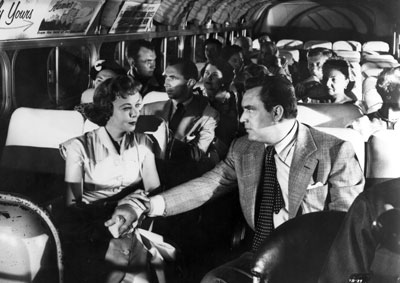Download a sample list of available titles and additional research resources at UCLA in PDF format.
Rumored to have been born underneath a dining room table during a Zeppelin raid over London in World War I, by 1933, at sixteen years old, Ida Lupino arrived in Hollywood appearing in films such as Search for Beauty (1934), Ready for Love (1934) and Anything Goes (1936).
By the 1940s, Lupino became known for starring roles in notable films including They Drive by Night (1940), High Sierra (1941) and The Man I Love (1946). At the end of the decade, the actress founded her own independent production company where she would write, produce and direct several films—an uncommon accomplishment for any actor of her generation, especially as one of the only women directors in the industry during this period.
As a feature film director, Lupino frequently captured a common theme of post-World World II domestic alienation, exploring ordinary citizens struggling amid social issues such as unwanted pregnancy (Not Wanted, 1949), polio (Never Fear, 1949) and rape (Outrage, 1950). While active behind the camera, Lupino continued to star in films including On Dangerous Ground (1952), The Big Knife (1955) and While the City Sleeps (1956). In The Bigamist (1953, restored by the UCLA Film & Television Archive), Lupino not only directed, but also joined actors Joan Fontaine and Edmond O’Brien on-screen.
During the 1950s, Lupino crossed-over into television where she appeared in a wide range of series, including Mr. Adams and Eve (1957-1958), a sitcom about a volatile Hollywood couple that she created as a vehicle for herself and her third husband, actor Howard Duff. Lupino’s career further expanded as she became a prolific director of episodic television, where her industry reputation for an aptitude with action led her to helm numerous westerns such as The Rifleman and genre programs like The Untouchables and The Twilight Zone. Her later career in television included directorial chores for popular sitcoms such as The Donna Reed Show, Bewitched, Gilligan’s Island and guest appearances on programs including Streets of San Francisco and Charlie's Angels.
Additional online resource: “The Trouble with Lupino” by Amelie Hastie, Comparative Cinema.
To arrange on-site research viewing access, please contact the Archive Research and Study Center (ARSC).







